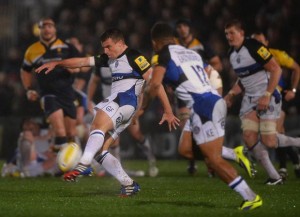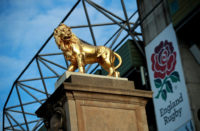 The seemingly routine announcement of amendments to the England elite squad on Thursday at Twickenham is the exact opposite. It is a make or break moment in Stuart Lancaster's attempts to forge a world champion side for 2015.
The seemingly routine announcement of amendments to the England elite squad on Thursday at Twickenham is the exact opposite. It is a make or break moment in Stuart Lancaster's attempts to forge a world champion side for 2015.
Great selection strategy is fundamental to success, and England need only cast envious glances in the direction of Wales, the side who scuppered their Grand Slam designs last season, to see its importance. Warren Gatland's early identification of George North and Alex Cuthbert as the huge wing war-horses to carry Wales to Six Nations success is its most recent manifestation – and Cuthbert's two tries in that 30-3 drubbing of Lancaster's outfit the last time the sides met is testament to it.
New Zealand and South Africa, the world's two best teams, also have an uncanny ability to spot talented players and promote them at the right time. Not only that, their coaches have the courage of their convictions and give them time on the pitch. That way neither the players, nor the coaches, are left wondering: “What if….”
New Zealand know that Aaron Cruden is ready to step into the fly-half breach when Dan Carter goes, and that Sam Cane provides the same cover for Richie McCaw, Charles Piutau for Cory Jane, Steven Luatua for Liam Messam, and Beauden Barrett for Israel Dagg.
South Africa can point to the rise of lock Eben Etzebeth (22), and the arrival of flanker Siya Kolisi (22), full-back Willie le Roux (24), centres Jan Serfontein (20) and JJ Englebrecht (24), and fly-halves Pat Lambie (23) and Johan Goosen (21), as evidence of their seamless succession planning.
England do not find it as easy, and there is a sense that even under Lancaster there is an innate conservatism which is a brake on the evolution of the side – and that the brake will be applied harder as the 2015 World Cup nears.
The England head coach can point to the partial clear-out he undertook of the 2011 World Cup squad – which in most respects was a no-brainer – and notable promotions of young stars such as Owen Farrell, Joe Launchbury, and Mako and Billy Vunipola.
Yet, overall the process of blooding new players has been a mixed bag. It has not been anywhere near as comprehensive, or effective, as has been touted by the England PR operation. This is particularly true of a backline which lacks the counter-attacking intuition and incisiveness of the All Blacks, Springboks, the Welsh – or the Australians by the end of their autumn campaign.

The reality is that there have been missed opportunities which have hampered the development of England's attack. For instance, while it may have made sense to combat South Africa's aerial attack on the summer tour of 2012 by employing two full-backs – pairing either Mike Brown, Ben Foden or Alex Goode – it was hard to see why Lancaster persisted with it throughout last season.
The upshot was that the England head coach ignored the form book and failed to give either Christian Wade or Jonny May a debut against Italy by dropping the out-of-sorts Chris Ashton (as I advocated at the time).
A week later in Cardiff the imbalance in the England back three was exposed when Cuthbert exploited Brown's lack of familiarity with wing defence. Before the tournament Brown had been playing out of his skin at full-back for Harlequins, but Goode kept the England shirt.
When Wade's chance came this autumn to build on his single summer cap against Argentina he missed out again, this time through injury. All of which means that the Premiership's top try-scorer's exposure at Test level is extremely limited. The same is true of May, whose international experience is also confined to playing one Test against a second string Pumas side on tour last summer.
It is also difficult to see what the plan has been with Matt Kvesic, right, and Kyle Eastmond, two other summer tour successes.
Kvesic came back from Argentina with such a glowing report card at openside that it seemed inconceivable that he would not at least get a chance off the bench during the autumn, irrespective of Gloucester's troubles. Yet, instead of being given an opportunity to nail down his credentials, he was allowed to drift out of contention for not single-handedly turning his new club around. Eastmond is another who would have benefitted from having to compete at a more rarified level. The Bath man had credentials every bit as strong as Joel Tomkins for a place in England's autumn midfield, either coming off the bench for Billy Twelvetrees at inside-centre, or having a tilt outside him once Henry Trinder's injury ruled him out at 13.
Now, with Trinder restored to fitness, the rumbustious Luther Burrell pressing Twelvetrees hard, and Anthony Watson emerging as a young star with match-winning flair and pace, the backline jigsaw that Lancaster has to piece together is complex.
However, part of that complexity stems from not taking the windows of opportunity to look at players when they were open during the Six Nations and autumn series of 2013.
The picture is also blurred around the edges at fly-half where Farrell now has increased competition from rivals like Danny Cipriani and George Ford, who, while they are not as accomplished as goal-kickers or defensively, are better playmakers.

January's EPS selection is Lancaster's best, and last, time for a shake-up – the opportunity for the England head coach to grasp the nettle and make the bold selection changes which could set his team on the road to glory.
That means improvement in playmaking, counter-attack, and finishing. I would bring Watson, Cipriani and Trinder into the Elite squad from the outside, and promote Ford, Burrell and May to the Elite squad from the Saxons.
This may be tilting at windmills because Lancaster has indicated he will make minimal changes, leaving injured players in the squad. In my view, that would be a mistake.
If he needs to make room and the medical advice is that Manu Tuilagi, Tom Croft, Ben Foden, Geoff Parling, Alex Corbisiero, Tomkins and Wade will not be fit for the tournament, he should cut them for now and promote new men.
On the evidence of the autumn internationals, and of the defeat in Cardiff, the attack requires urgent attention, extending from scrum-half to full-back. While the English pack may have the credentials to make the Southern Hemisphere big three pause for thought, the same cannot be said of the backs.
They are seen as short of pace, perception, and (minus Tuilagi) power. That is why any impartial rugby juror will tell you now that England are not a world champion side in the making.
It means Lancaster being open to the suggestion that there is an alternative backline which is superior to his current line-up in every sense.
It means fast-tracking speedsters like Watson and May in the back three to make the most of Brown's sinuous breaks. It might mean giving Danny Care an extended run, and taking a long hard look at whether Farrell can inject the tempo into England's game needed to break the best, or whether Ford or Cipriani hold the answer.
If that seems drastic, it is because England are not as good as Lancaster's 63.6 per cent winning average indicates.
That they have hit some high notes is a matter of record, with the resounding autumn win over New Zealand in 2012 the peak, and the away win over France in Paris in his first season in charge, another red letter day.
However, history tells us that to win the World Cup a team has to be able to not just back up its victories over the best opposition, but to pull off three or four big wins in succession, with no South Pacific slip-ups along the way.

With Wales, Australia and Fiji in their group England will require five big wins in succession, and that leaves the odds stacked heavily against Lancaster's team.
So far, the England coach's record has been padded out by multiple victories over teams which are outside the top eight in the IRB world rankings. This includes Argentina (10th) beaten three times, Italy (13th) twice, Scotland (9th) twice, and Fiji (11th) once.
Set against that, during Lancaster's tenure England have failed to record wins against either South Africa (three Tests) or Wales (two Tests), and their one each record against New Zealand and Australia is likely to be in deficit at the end of this summer's three-Test series in the Land of the Long White Cloud.
Even more significantly, Lancaster's England have never won back-to-back victories over opponents ranked in the IRB's top five.
The closest they have come to notable back-to-back wins came last February in the Six Nations when, after beating France (5th) at Twickenham, they went to Dublin and edged past Ireland (6th). That was followed by the flat home victory over Italy before Grand Slam obliteration in Cardiff.
Chris Robshaw has said that a loss of such magnitude, “won't happen again”. He may be proved right in terms of the margins of defeat, mainly because England have learned from their errors and are a gritty, well-organised bunch.
However, putting together a five-match winning run against top opposition is something Lancaster's England have not come close to doing so far.
Yet, there is a golden window of opportunity for England to build confidence and establish cast-iron credibility. With England (4th), France (5th), Wales (6th) and Ireland (7th), the protagonists are bunched together as tightly as they have been for years going into this Six Nations.
If England can beat France in Paris and Scotland in Edinburgh, and then see off Ireland and Wales at Twickenham, then only Italy stand between them and the Grand Slam they lost last season. To stand any chance of a clean sweep they will have to improve out of sight as an attacking force.


























